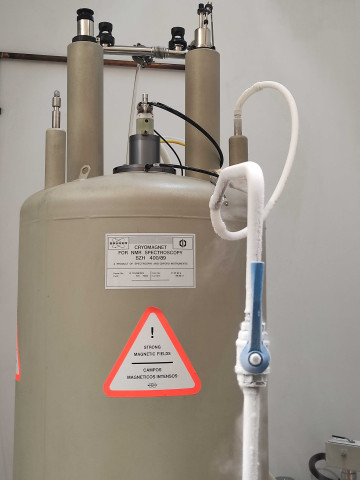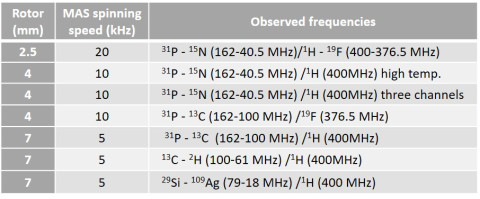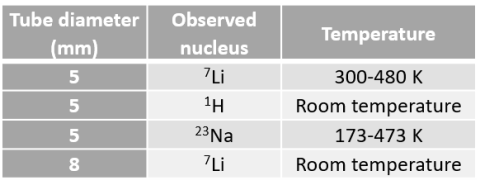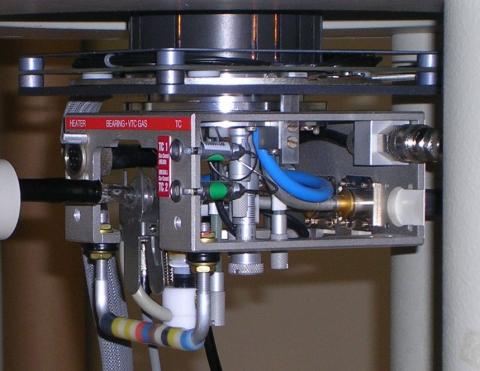Solid-State Nuclear Magnetic Resonance (SS-NMR)
Scientific in charge
Dr. Isabel Sobrados (Senior Scientist)
Technician
Dr. Virginia Díez (Specialized Superior Technician)
Lda. Sandra Martínez Chaparro (Scientific facilities staff)
Contact
+34 913349000 ext. 437393
+34 917166529 (direct number)
Location
Lab S53 (basement)
ICMM-CSIC, C/ de Sor Juana Inés de la Cruz, 3 28049 Madrid, España

Measurements
• Static experiments between -130 and 150ºC.
• MAS experiments between -70 and 150ºC (up to 30000 Hz).
• Decoupling experiments for proton or fluor.
• CPMAS experiments with proton or fluor decoupling.
• MQMAS experiments for quadrupolar nuclei.
• Measurement of diffusion coefficients for proton, lithium and sodium.
- Measurement of relaxation times.
Equipment
- NMR Spectrometer AVANCE II (400 BRUKER), 9.4 Tesla magnet.
- MAS probes for different spinning speeds for the study of a wide range of nuclei:

- Probe for pulse field gradient static experiments(4 inserts available):


- Probe static experiments for nuclei 31P - 109Ag (162-18 MHz)
Allowed Samples
Samples must be provided preferably grinded. If necessary, further grinding will be carried out by the NMR facility staff unless opposite specifications are detailed.
The optimum amount of sample to run MAS NMR experiments is as follows:
- 7 mm. rotors: 200-400 mg.
- 4 mm. rotors: 100-200 mg.
- 2.5 mm. rotors: 30-50 mg.
The concentration of ferromagnetic and/or paramagnetic species can not be over 5% by weight. If present, it is mandatory to indicate its nature and approximate concentration. The user will be responsible for the damages caused to the spectrometer by ferromagnetic and/or paramagnetic impurities which are not reflected in the request form.
Types of analyzed samples
The Solid State Nuclear Magnetic Resonance laboratory of the Materials Science Institute of Madrid makes this technique available to OPIS, Universities and companies.
The usefulness of the NMR technique in the study of amorphous, glassy or crystalline materials is high. The local study of the environment occupied by atoms in ordered or disordered networks makes NMR a powerful technique for characterizing ceramic materials, vitreous materials, polymers, catalysts, electrolytes for energy applications, zeolites, clays, cements, etc.
Procedures and standards
It is possible to request advice and a quotation for the analyses to be carried out by contacting the personnel of the service.
The Solid State Nuclear Magnetic Resonance facility is strongly committed to high quality and continuous improvement, seeking internal and external satisfaction. Our organizational model adopts the principles of integrity, independence, technical competence, effectiveness and efficiency and continuous improvement of the quality of services and procedures.
ICMM management promotes this management policy and provides the necessary resources to ensure the quality of its activities and the fulfilment of its mission.
Service acceptance records for users and laboratories are available. These records reflect the characteristics of the tests to be performed. There is a centralized management of users, requests and invoicing. There are standard operating procedures for the maintenance and verification of the equipment, as well as for the performance of the different analyses offered. Pulse calibrations, pulse sequence adjustments, magic angle rotation and ppm scales checks are carried out with the corresponding reference materials.
The service provides users with a form (in Spanish and English) to communicate proposals for improvement and to express their dissatisfaction or congratulations in relation to the service. It can be accessed both from the website of the Scientific and Technical Services Unit and from the service itself.
Further information: service webpage
Instituto de Ciencia de Materiales de Madrid (ICMM)
Sor Juana Ines de la Cruz, 3
Cantoblanco, 28049
Madrid, España
Telephone: (+34) 91 334 90 00
Email: @email
Communication Office: @email

Acknowledge the Severo Ochoa Centres of Excellence program through Grant CEX2024-001445-S/ financiado por MICIU/AEI / 10.13039/501100011033

Contacto | Accesibilidad | Aviso legal | Política de Cookies | Protección de datos



